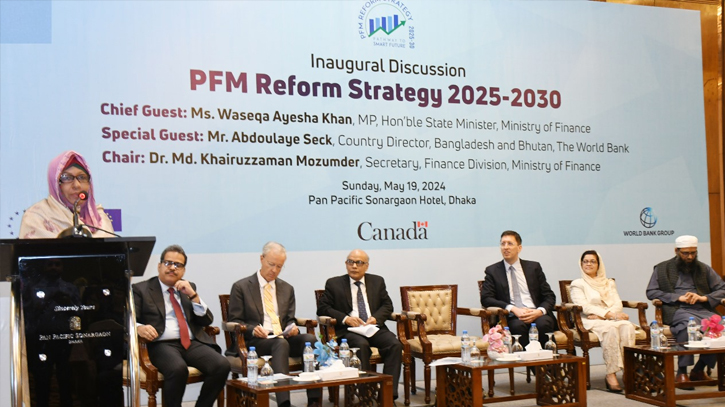
State Minister for Finance Waseqa Ayesha Khan. Photo: Collected
State Minister for Finance Waseqa Ayesha Khan called for policy planners, academics and development partners to assist in creating a robust and efficient financial management system for Bangladesh in order to ensure the country’s economic stability and promote sustainable growth.
Launching the process for creating the Public Financial Management Strategy (PFM) for 2025-2030 in Dhaka on Sunday (19 May), the State Minister said, “PFM Strategy comes at a critical juncture for Bangladesh, as we navigate through unprecedented challenges and opportunities in the global economic landscape.”
As the country confront the far-reaching impacts of the COVID-19 pandemic, it has become increasingly clear that resilient and effective financial management systems are essential for safeguarding our nation's economic stability and fostering sustainable development, she said.
The State Minister said, “As we embark on this journey towards formulating the PFM strategy, let us remain steadfast in our commitment to excellence, innovation and collaboration. Together, we have opportunity to shape a future where Bangladesh’s financial management systems are not only resilient and efficient but also equitable and inclusive, laying the foundation for sustained prosperity for generation to come.”
Presided over by Dr. Md. Khairuzzaman Mozumder, Secretary, Finance Division, the meeting was attended by Barnard Haven, Acting Country Director for Bangladesh and Bhutan, the World Bank as Special Guest.
Dr. Michal Krejan, Head of Cooperation (HoC), European Union Delegation to Bangladesh, Joe Goodings, Head of Corporate/Development Assistance, High Commission of Canada and Sylvia Islam, Senior Development Advisor, Global Affairs Canada also addressed the inaugural discussion.
Abu Daiyan Mohammad Ahsanullah, Joint Secretary, Finance Division made a presentation on Pathway to PFM Reform Strategy 2025-2030.
Dr. Md. Khairuzzaman in his speech said enhancing PFM has remained a fundamental aspect of reforms aimed at fostering effective macroeconomic management and promoting good governance.
Effective PFM is an essential tool that ties together available resources, delivery of services and achievement of government policy objective, he said adding although significant improvement has already been done in PFM reform area in Bangladesh, more coordinated efforts are required from all stakeholders for maximizing the benefits from it.
Barnard Haven in his speech said Bangladesh has made remarkable progress on Public Financial management leveraging new technologies, adding, “I have seen incredible progress on systems like the integrated budget and accounting system, e-procurement and automated payments.”
The inaugural session was followed by two technical sessions.
The 1st session- “Reflection from the Government Key Stakeholders” was addressed by Rehana Parven Member (Secretary) Planning Commission, Md. Masud Sadiq, Member (Customs, Policy and ICT), National Board of Revenue and Md. Mofidur Rahman, Additional Secretary, Finance Division.
The second session was moderated by Suraiya Zannath, Lead Governance Specialist, Financial Management, the World Bank named “Voices from other Key Stakeholders”.
It was addressed by Mohammad Muslim Chowdhury, former Comptroller and Auditor General, Ramendra Nath Biswas, Director General, Institute of Public Finance and Dr. Monzur Hossain, Research Director, Bangladesh Institute of Development Studies.
Earlier, two robust PFM Reform Strategies were formulated for 2007-12 and 2016-21 to take forward the ongoing agenda of reforms and establish broader ownership of the reform process by the government.
Bangladesh now seeks to transform its PFM system into a technology-driven, enhanced performance orientation and efficient public expenditure management system to support improved service delivery and sustainable development.
The PFM Reform Strategy 2025-2030 aims to address gaps and outstanding issues of previous PFM reform initiatives; cover broader political mandates- Smart economy, Smart citizens etc. in alignment with PFM functionalities.
Messenger/Sumon








